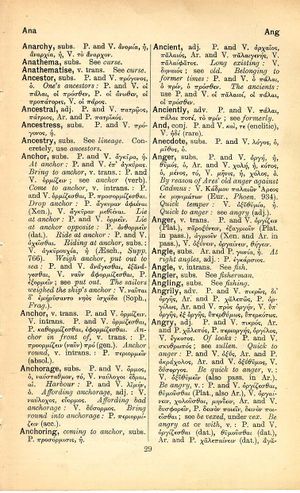ancient: Difference between revisions
From LSJ
Sunt verba voces quibus hunc lenire dolorem possis, magnam morbi deponere partem → Words will avail the wretched mind to ease and much abate the dismal black disease.
(CSV3) |
m (Woodhouse1 replacement) |
||
| Line 1: | Line 1: | ||
{{Woodhouse1 | {{Woodhouse1 | ||
|Text=[[File:woodhouse_29.jpg|thumb|link={{filepath:woodhouse_29.jpg}}]] | |Text=[[File:woodhouse_29.jpg|thumb|link={{filepath:woodhouse_29.jpg}}]] | ||
===adjective=== | |||
P. and V. [[ἀρχαῖος]], [[παλαιός]], Ar. and V. [[παλαιγενής]], V. [[παλαίφατος]]. | [[prose|P.]] and [[verse|V.]] [[ἀρχαῖος]], [[παλαιός]], [[Aristophanes|Ar.]] and [[verse|V.]] [[παλαιγενής]], [[verse|V.]] [[παλαίφατος]]. | ||
[[long existing]]: [[verse|V.]] [[δηναιός]]; see [[old]]. | |||
[[belonging to former times]]: [[prose|P.]] and [[verse|V.]] [[ὁ πάλαι]], [[ὁ πρίν]], [[ὁ πρόσθεν]]. | |||
[[the ancients]]: use [[prose|P.]] and [[verse|V.]] [[οἱ παλαιοί]], [[οἱ πάλαι]], [[οἱ πρόσθεν]]. | |||
}} | }} | ||
Revision as of 08:54, 20 May 2020
English > Greek (Woodhouse)
adjective
P. and V. ἀρχαῖος, παλαιός, Ar. and V. παλαιγενής, V. παλαίφατος.
long existing: V. δηναιός; see old.
belonging to former times: P. and V. ὁ πάλαι, ὁ πρίν, ὁ πρόσθεν.
the ancients: use P. and V. οἱ παλαιοί, οἱ πάλαι, οἱ πρόσθεν.

